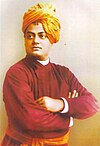Related Research Articles
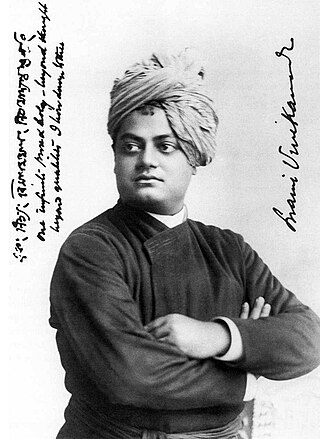
Swami Vivekananda, born Narendranath Datta, was an Indian Hindu monk, philosopher, author, religious teacher, and the chief disciple of the Indian mystic Ramakrishna. He was a key figure in the introduction of Vedanta and Yoga to the Western world, and the Father of modern Indian nationalism who is credited with raising interfaith awareness and bringing Hinduism to the status of a major world religion.
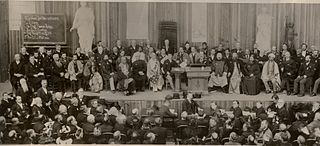
There have been several meetings referred to as a Parliament of the World's Religions, the first being the World's Parliament of Religions of 1893, which was an attempt to create a global dialogue of faiths. The event was celebrated by another conference on its centenary in 1993. This led to a new series of conferences under the official title Parliament of the World's Religions with the same goal of trying to create a global dialogue of faiths.

Sister Nivedita was an Irish teacher, author, social activist, school founder and disciple of Swami Vivekananda. She spent her childhood and early youth in Ireland. She was engaged to marry a Welsh youth, but he died soon after their engagement.
Swamiji is a 2012 laser show and documentary film directed and produced by Manick Sorcar. Based on the life story of Hindu monk Swami Vivekananda (1863–1902), it is the first laser documentary made on an individual and the first full-length laser documentary ever to be shown in a performing arts center.
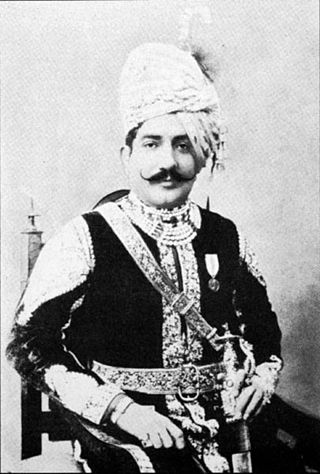
Raja Ajit Singh Bahadur was the ruler of the Shekhawat estate (thikana) of Khetri at Panchpana in Rajasthan between 1870 and 1901. He was born on 16 October 1861 at Alsisar. His father was Thakur Chattu Singh, a resident of Alsisar. Ajit Singh was later adopted to Khetri and after the death of Fateh Singh, he became the eighth king of Khetri in 1870. In 1876, he married Rani Champawatiji Sahiba and the couple had one son and two daughters. He died on 18 January 1901 due to an accident at the tomb of Akbar in Sikandra near Agra and was cremated at Mathura.

Josiah John Goodwin was a British stenographer and a disciple of Indian philosopher Swami Vivekananda. Goodwin is known for recording Vivekananda's speeches, and it is thought that without his efforts most of Vivekananda's works would have been lost.

George Frederick Pentecost (1842–1920) was a prominent American evangelist and co-worker with Revivalist D.L. Moody.
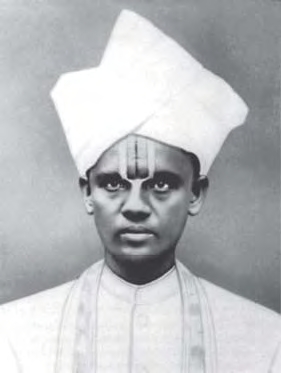
Alasinga Perumal was a propagator of Vedanta and an ardent follower of Swami Vivekananda. Born in an orthodox Vaishnavite family at Chikkamagalur of Mysore, he took his education in Madras. After obtaining a B.A. degree in science, he started his career as a school teacher.

John Henry Barrows (1847–1902) was an American clergyman of First Presbyterian Church (Chicago) and Chairman of the 1893 General Committee on the Congress of Religions. He claimed that Abraham Lincoln had become a Christian in 1863.

Josephine MacLeod was an American friend and devotee of Swami Vivekananda. She had a strong attachment to India and was an active participant in the Ramakrishna Vivekananda movement. She was given the nicknames "Tantine" and "Jo Jo" by Vivekananda. She considered Swami Vivekananda to be her friend and helped him with his finances. MacLeod was not a sanyasin, unlike many others such as Sister Nivedita or Sister Christine. She was instrumental in spreading Vivekananda's message on Vedanta in the West. She made many contributions to the initial and the later phases of the development of the order of Ramakrishna and Vivekananda. She was a contributor to many causes espoused by Sister Nivedita, the most famous disciple of Vivekananda, including that of contributing financially towards the development of the Indian National Movement especially in Bengal and elsewhere in India.

Swami Vivekananda (1863–1902) was an Indian Hindu monk and a key figure in the introduction of Indian philosophies of Vedanta and Yoga to the western world. He was one of the most influential philosophers and social reformers in his contemporary India and the most successful and influential missionaries of Vedanta to the Western world. Indian Nobel laureate poet Rabindranath Tagore's suggested to study the works of Vivekananda to understand India. He also told, in Vivekananda there was nothing negative, but everything positive.

Inspired Talks is a book compiled from a series of lectures of Swami Vivekananda. From mid-June to early August 1895, Vivekananda conducted a series of private lectures to a group of selected disciples at Thousand Island Park. A number of lectures were recorded by Sara Ellen Waldo and she then published those as a book.

Swami Vivekananda represented India and Hinduism at the Parliament of the World's Religions (1893). India Celebrates National youth day on birth anniversary of the Great Swami. This was the first World's Parliament of Religions, and it was held from 11 to 27 September 1893. Delegates from all over the world joined this Parliament. In 2012 a three-day world conference was organized to commemorate 150th birth anniversary of Vivekananda.
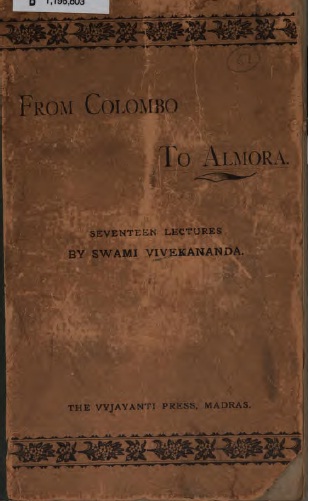
Lectures from Colombo to Almora (1897) is a book of Swami Vivekananda based on the lectures he delivered in Sri Lanka and India after his return from the West. Vivekananda reached Colombo, British Ceylon on 15 January 1897. After delivering lectures in Colombo and Jaffna, Vivekananda arrived at Pamban in South India. A forty-feet high monument was built by the king of Ramnad, Bhaskara Sethupathi, on the spot where he landed to celebrate his achievements at the West. Vivekananda travelled extensively and visited many Indian states delivering lectures on a variety of topics. On 19 June 1897, he reached Almora. The lectures delivered by him in this period were compiled into the book Lectures from Colombo to Almora.
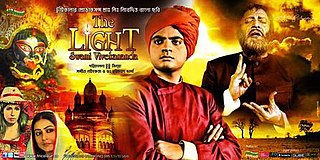
The Light: Swami Vivekananda (2013) is a bilingual film directed by Utpal (Tutu) Sinha and produced by Tri Colour productions private limited. The film is based on the life and teaching of Swami Vivekananda. The film was a tribute to Vivekananda on the 150th anniversary of his birth. The film was dubbed in 18 languages.

Swami Vivekananda was an Indian Hindu monk. He was a key figure in the introduction of the Hindu philosophies of Vedanta and Yoga to the western world. The 150th birth anniversary of Swami Vivekananda was celebrated all over India and in different countries in the world. Ministry of Youth Affairs & Sports of India decided to observe 2013 as the year of 150th Birth Anniversary of Swami Vivekananda. Year-long events and programs were organised by different branches of Ramakrishna Math, Ramakrishna Mission, central government and different state governments of India, education institutions, youth groups etc. Bengali film director Tutu (Utpal) Sinha made a film The Light: Swami Vivekananda as a tribute to Swami Vivekananda on his 150th birth anniversary. The movie was released on 23 August 2013.

Sister Christine or Christina Greenstidel was a school teacher, and close friend and disciple of Swami Vivekananda. On 24 February 1894, Christine attended a lecture of Vivekananda in Detroit, United States which inspired her. She started communicating with Vivekananda through letters. Christine went to India in 1902 and began working as a school teacher and a social worker.
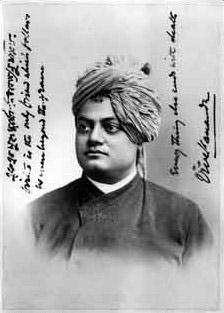
"Buddhism, the Fulfilment of Hinduism" is a lecture delivered by Indian Hindu monk and expounder Swami Vivekananda on 26 September 1893 at the Parliament of the World's Religions in Chicago. In this lecture, he expressed his opinion that "Buddhism was the fulfilment of Hinduism."

Swami Vivekananda, the nineteenth-century Indian Hindu monk, is considered one of the most influential people of modern India and Hinduism. Rabindranath Tagore suggested to study Vivekananda's works to learn about India. Indian independence activist Subhas Chandra Bose regarded Vivekananda as his spiritual teacher. Mahatma Gandhi said that after reading the works of Vivekananda, his love for his nation became a thousand-fold.

The relationship between Ramakrishna and Vivekananda began in November 1881, when they met at the house of Surendra Nath Mitra. Ramakrishna asked Narendranath to sing. Impressed by his singing talent, he invited him to Dakshineswar. Narendra accepted the invitation, and the meeting proved to be a turning point in the life of Narendranath. Initially Narendra did not accept Ramakrishna as his master and found him to be a "mono maniac", but eventually he became one of the closest people in his life. Ramakrishna reportedly shaped the personality of Narendranath and prepared him to dedicate his life to serve humanity. After the death of Ramakrishna, Narendra and his other monastic disciples established their first monastery at Baranagar.
References
Footnotes
Citations
- 1 2 Sharma 1987 , p. 15
- 1 2 Chattopadhyaya 1999 , p. 144
- 1 2 Engebretson 2010 , p. 679
- ↑ Ghosh 2003, p. 81.
- 1 2 3 Chattopadhyaya 1999, p. 344.
- ↑ "Isaac Taylor Headland (1859 - 1942)" (PDF). Columbia University Archives. Retrieved 19 September 2014.
- ↑ "The Worlds Parliament Of Religions Vol II". Religion in Peking. by Prof. Isaac T. Headland. Archive organization. pp. 1019–1023. Retrieved 19 September 2013.
- ↑ "Religion not the crying need of India". Chicago Inter Ocean. 21 September 1893. Retrieved 18 September 2013.
- 1 2 RKMIC 2002 , p. 463
- 1 2 3 "Religion not the crying need of India". Chicago Inter Ocean . 21 September 1893. Archived from the original on 10 September 2013. Retrieved 10 September 2013.
- ↑ Prashad 2000 , p. 41
Sources
- Sharma, Gurumayum Ranjit (1987). The Idealistic Philosophy of Swami Vivekananda. Atlantic Publishers & Distri. GGKEY:PSWXE5NTFF4. Retrieved 10 September 2013.
- RKMIC, Kolkata (2002). Bulletin of the Ramakrishna Mission Institute of Culture. The Institute. Retrieved 10 September 2013.
- Chattopadhyaya, Rajagopal (1999). Swami Vivekananda in India: A Corrective Biography. Motilal Banarsidass. ISBN 978-81-208-1586-5 . Retrieved 10 September 2013.
- Ghosh, Gautam (2003). The Prophet of Modern India: A Biography of Swami Vivekananda. Rupa & Company. ISBN 978-81-291-0149-5.
- Engebretson, Kath (2010). International Handbook of Inter-religious Education. Springer. ISBN 978-1-4020-9260-2 . Retrieved 10 September 2013.
- Prashad, Vijay (2000). The Karma of Brown Folk . U of Minnesota Press. p. 41. ISBN 978-0-8166-3439-2 . Retrieved 11 September 2013.
